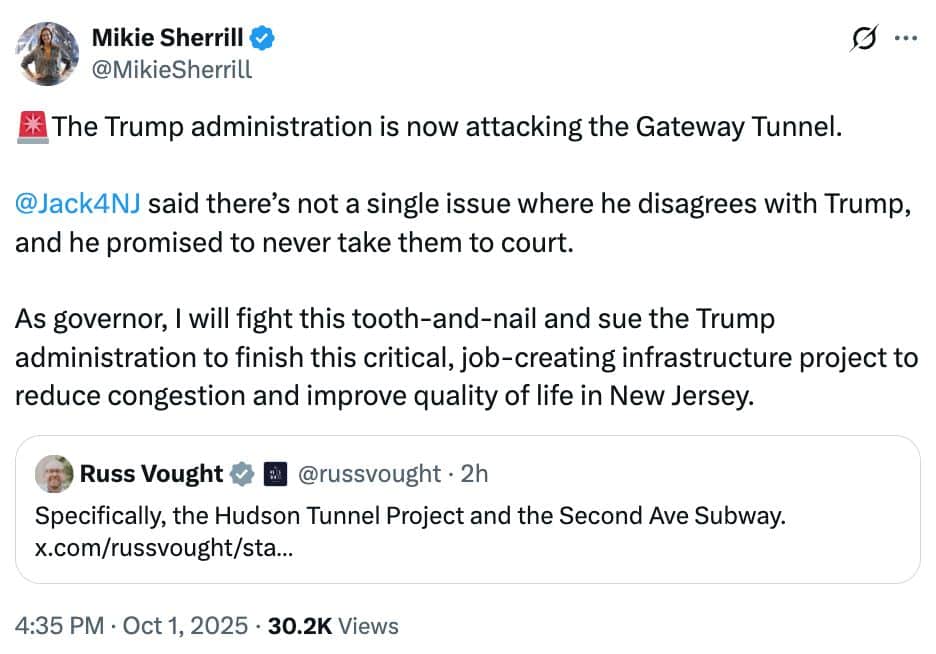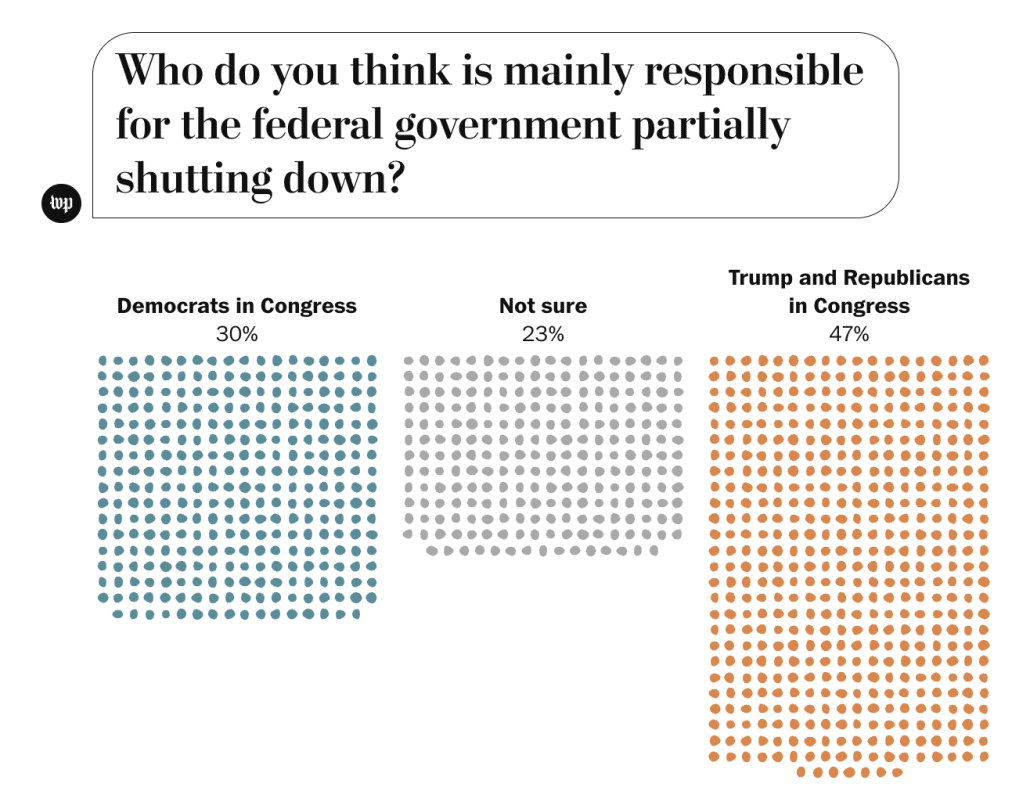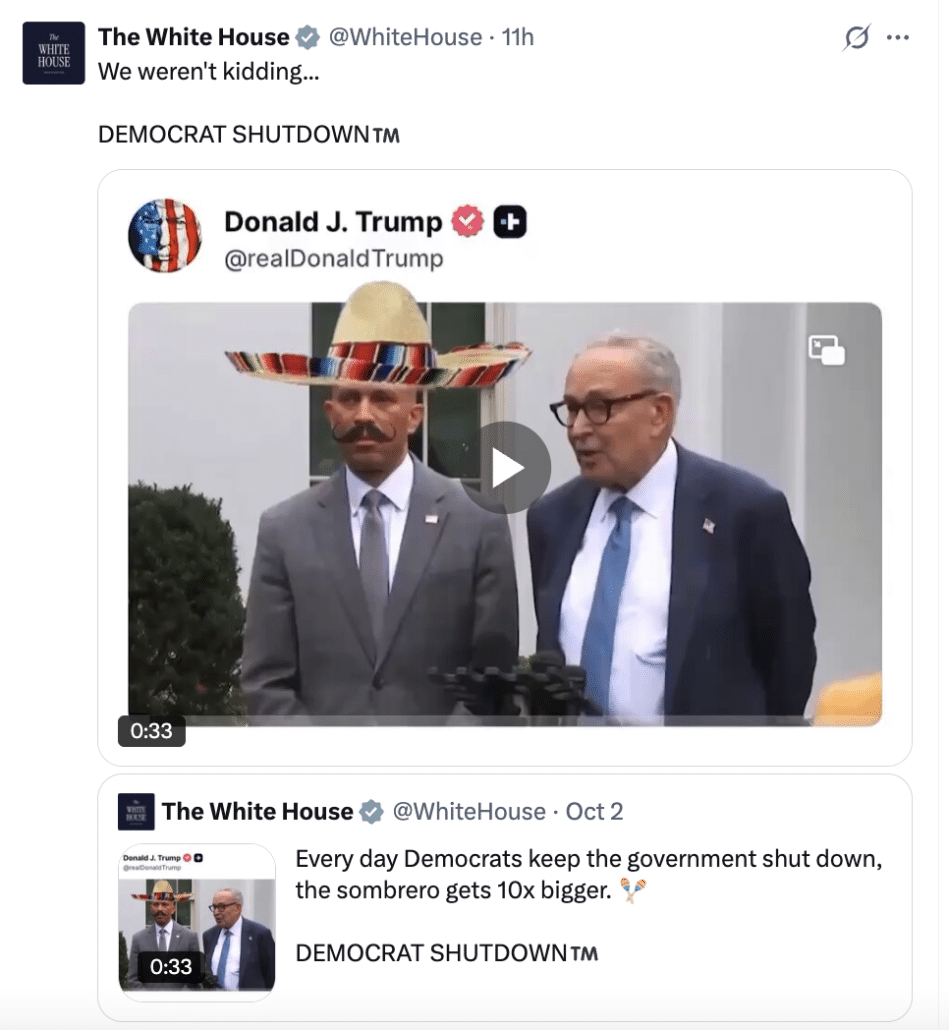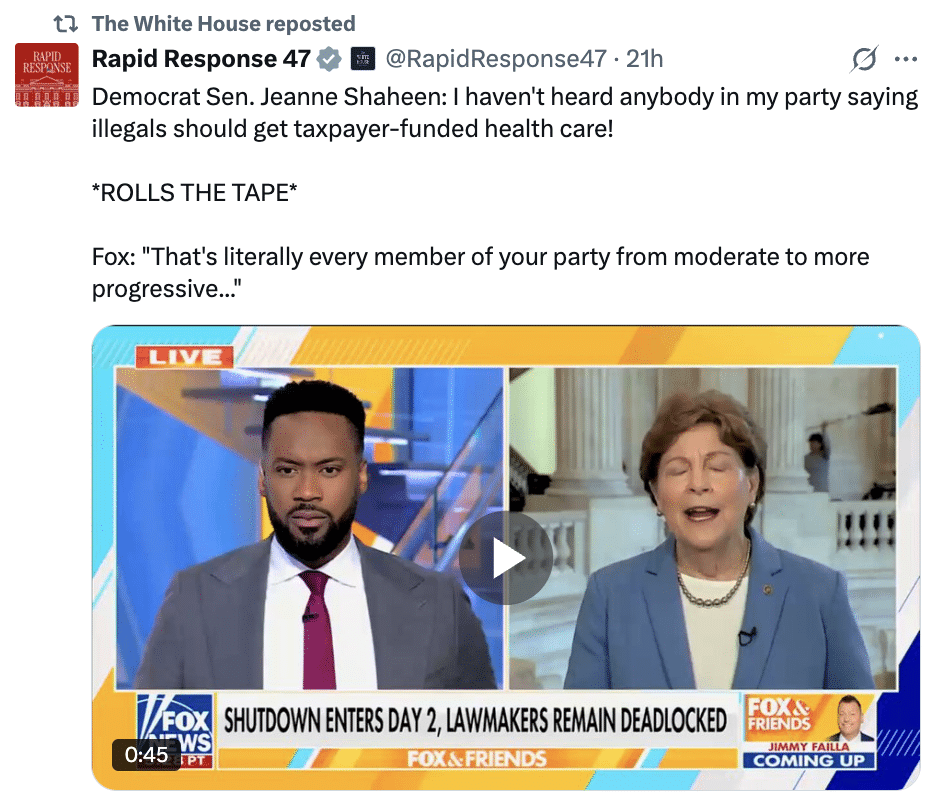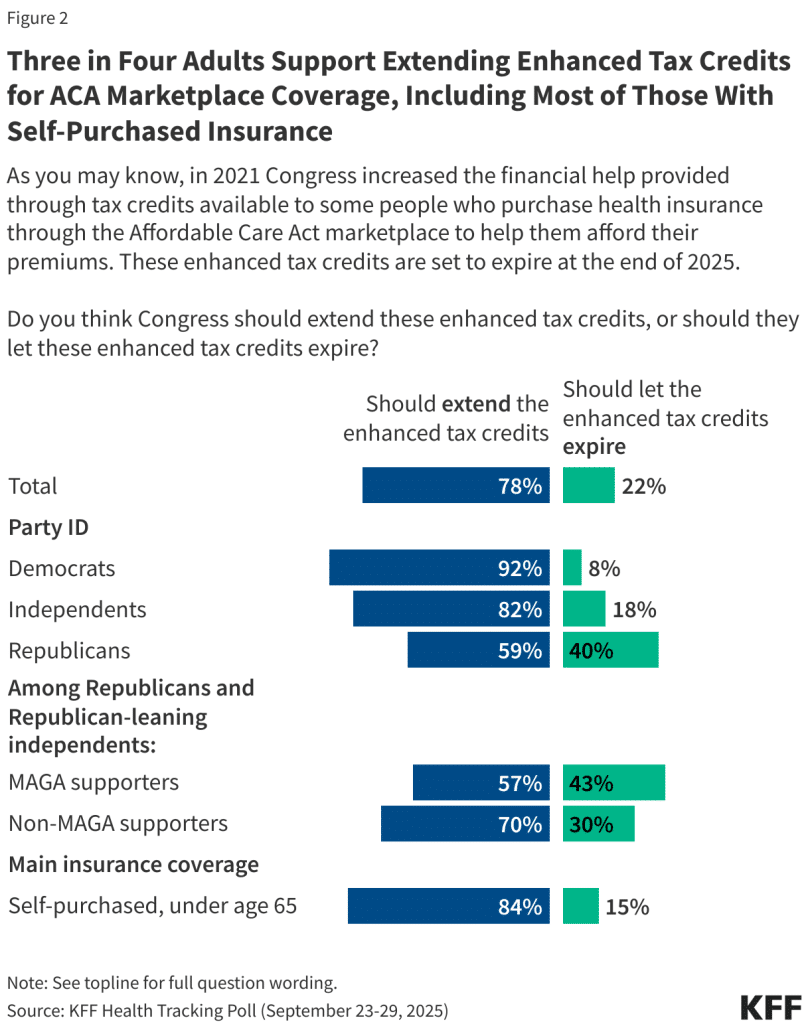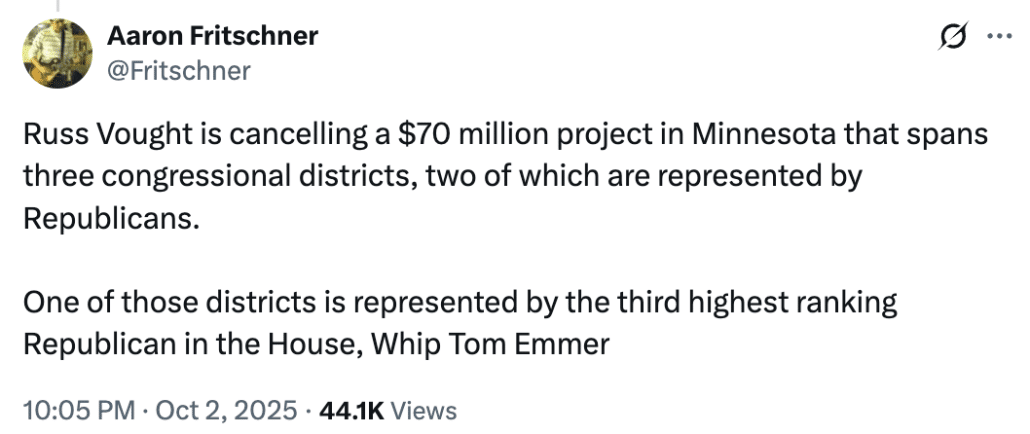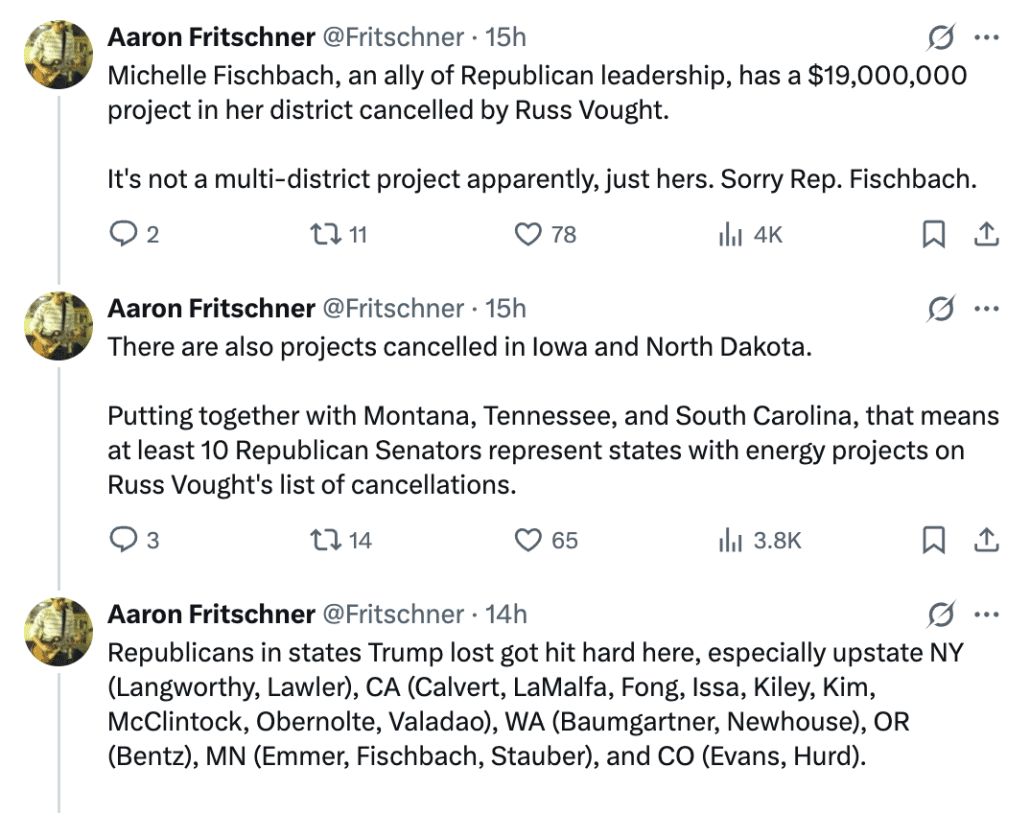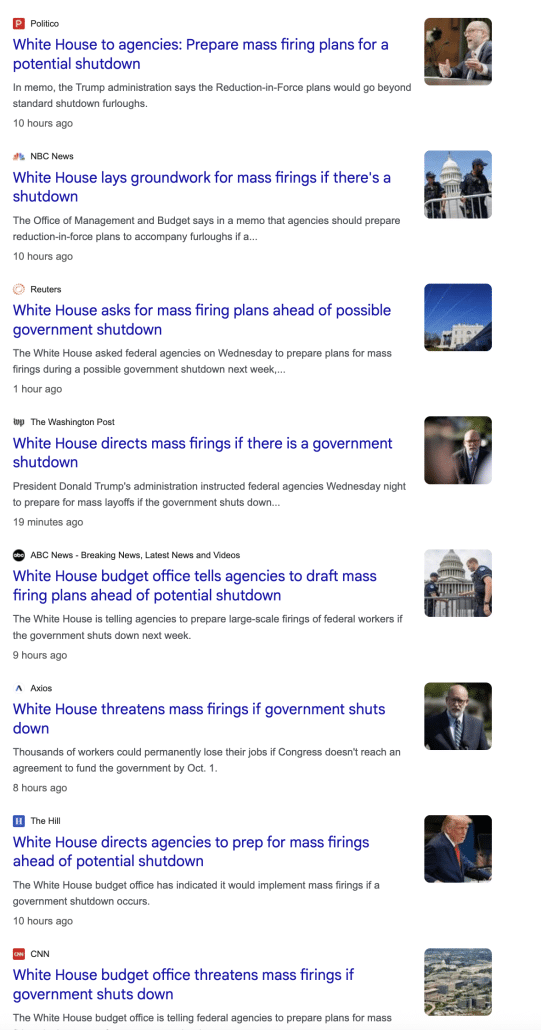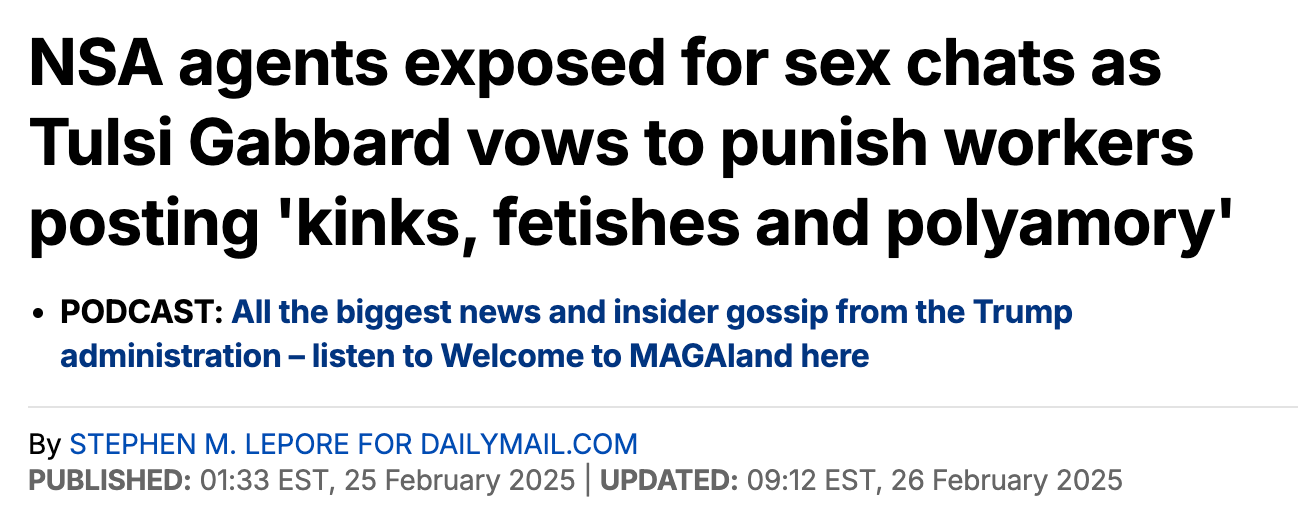Yesterday, at 5:46PM, the Senate rejected a cloture vote on the Democratic continuing resolution, which in addition to funding government, would extend healthcare support and prohibit impoundment. It was a party line vote.
Yesterday, at 6:41PM, the Senate rejected a cloture vote on the Republican continuing resolution. Three Democrats voted with 52 Republicans in favor:
- Catherine Cortez Masto
- John Fetterman
- Angus King
Rand Paul voted with Democrats against.
And so, at midnight, nonessential functions of the Federal government started to shut down.
Both NYT and WaPo have pieces explaining that polarization is at the core of the shutdown. That’s facile. Three Democrats, certainly moderates, already did vote with Republicans. The six who voted to let Republicans vote for the continuing resolution (and in Jeanne Shaheen’s case, also for the CR) in March — Dick Durbin, Kirsten Gillibrand, Maggie Hassan, Gary Peters, Brian Schatz, as well as Chuck Schumer — could well cave now, though several of these (at least Durbin and Schatz) did so from an institutionalist view rather than a centrist one. The truly radical edges of Senate which are, with perhaps only Bernie as the exception, on the far right, have always been the ones to push for a shutdown in the past.
One reason we don’t know how things will go is that the conventional wisdom about shutdowns may — may — no longer apply. In my opinion, a lot will depend on what becomes visible because of the shutdown, a lot will depend on how far public opinion deviates, and in which direction, from beltway conventional wisdom.
Seeing Russ Vought
Start with Russ Vought. To my mind, too few Democrats have framed their primary message — that this is a fight to actually return to existing funding levels before the Big Ugly Bill stripped healthcare from millions of Americans and from rural hospitals — to include the power of the purse. That is, almost no one is being told that the issue, and one of two main differences in the competing continuing resolutions, pertains to protecting Congress’ power of the purse.
The SCOTUS shadow docket opinion permitting Vought to usurp that power as the case moves forward has raised the stakes of this for Democrats and, as this Politico article lays out, made it easier for them to explain the stakes.
Now the Supreme Court’s brief but potent ruling last Friday giving Trump the thumbs up to withhold $4 billion is serving as lighter fluid for Democrats’ escalating rage.
Sen. Jeff Merkley (D-Ore.), a senior appropriator, called the Supreme Court decision “an absurdity” and “a pile of garbage,” adding that the justices were in effect dabbling at “policymaking — not constitutional law.”
The battle to rein in Trump and White House budget director Russ Vought through a piece of must-pass legislation has been eclipsed by Democrats’ larger push to extend expanded Affordable Care Act tax credits that are due to expire at the end of the year.
But Democrats are seething about the Supreme Court’s “shadow docket” opinion, arguing that Trump and the high court are ignoring the intent of the 1974 law designed to prevent presidents from withholding federal cash. And they see themselves as the last line of defense.
“He is unchecked at this point,” Rep. Marcy Kaptur (D-Ohio), another senior appropriator, said of Trump in an interview. “We have to check him. No one should have that kind of power.”
Angus King’s feckless explanation for why he voted with Republicans unintentionally makes the political case why.
[B]y shutting the government, we’re actually giving Donald Trump more power. And that was why I voted yes. I did not want to hand Donald Trump and Russell Vought and Stephen Miller additional power to decimate the federal government, to decimate the programs that are so important to so many people.
Here is what Donald Trump said just this afternoon: ‘We can do things during a shutdown that are irreversible, that are bad for them. He means the Democrats like cutting vast numbers of people out, cutting things that they like, cutting programs that they like. We can do things medically in other ways, including benefits we can cut numbers of people out.’
Maya Angelou once said, ‘If someone tells you who they are, you should believe them.’ Donald Trump, in this quote, tells us what he plans to do if there’s a shutdown and it will not be good for the American people. This was a difficult vote, but in the end, I could not, in good conscience, vote to shut the government down and hand even greater power to the trio of Donald Trump, Stephen Miller and Russell Vought. This was a vote of conscience on behalf of the State of Maine and the people of the United States.
It is absolutely true that Trump gets to decide which government functions are essential and non-essential. It is absolutely the case that ICE will be on the streets even while Courts will soon have to work at a slower pace, meaning it will be harder to get emergency orders preventing imminent harm, as the ACLU was able to do within hours of the March shutdown.
But King is failing basic civics if he thinks this shutdown gives Russ Vought any new power than he had yesterday, any more power than he was usurping yesterday, a point the American Prospect made yesterday.
That Supreme Court ruling involved $4 billion in foreign aid funding that the administration semi-formally tried to rescind; it doesn’t include the $410 billion that the White House has simply withheld from programs across the country. That represents close to half of all outlays in the fiscal year 2025 nondefense discretionary budget, which have simply vanished, perhaps permanently after the last day of the fiscal year, which is today. The Office of Management and Budget, as Rep. Rosa DeLauro (D-CT) has explained, has offered no explanation of how money is being spent or where withheld spending is going.
About 12 percent of the federal workforce has been terminated. Last week, we heard threats from OMB director Russ Vought that a shutdown will really allow the Office of Management and Budget to fire workers. A shutdown provides no actual legal authority to fire federal employees, but then again there was no legal authority to rescind or withhold appropriated spending without congressional approval, or put workers on extended administrative leave, as they did with the unauthorized buyout back in January.
As Daniel Schuman points out, Vought presented guidance to agencies in February that they should prepare for mass layoffs by today, September 30. Any allegedly shutdown-induced “mass layoff” should be seen as the continuation of an existing plan that has been public for seven months.
The larger point is that the government is already shut down, and has been for several months, as the Trump administration initiated an assault on this system of government. Activities deemed “essential” by the president—stalking immigrants, lobbing missiles at Iran, etc.—have gone on, but activities purported to conflict with the president’s policies, regardless of whether they have been authorized by the lawmaking body of the United States, have been stopped, interrupted only by occasional federal courts telling the president that doing so is illegal, which the Supreme Court subsequently brushes aside.
The shutdown can certainly be used rhetorically to justify more firings, but they’re just the same firings with a different rationale, one that is no more legal or legitimate than before. Of course, “legal” and “legitimate” are loaded words given the rubber-stampers at the Supreme Court.
What changes with Trump’s promise that he’s going to start retaliating against Democrats — on top of the fact that 40% of the workers he will be targeting are Trump voters and on top of the fact that the policies he will target are the ones that help average Americans and so are popular — is that to use this as leverage, Trump has to claim credit.
Trump has to make visible all the damage he’s doing to the services government offers.
That doesn’t change the legal reality (that, with SCOTUS’ blessing, Trump is usurping the constitutional powers of Congress). It has the ability to change the politics. It’ll be DOGE all over again, where Elon Musk’s loud bragging about the damage he was doing made him an easy political target.
Now it’s Russ Vought’s turn to become the villain in the popular understanding.
Live by healthcare and die without it
Progressives have hated the Democratic focus on healthcare (and it didn’t even keep all 47 Democratic Senators on board).
But now everyone is stuck with those terms and it is time to exploit it. The longer this shutdown goes, the more obvious the initial effects of the Big Ugly bill in terms of rural hospital shutdowns and expiring subsidies for ACA premiums will become.
It makes it easy to demonstrate — as Tammy Duckworth did here — how badly Republican members of Congress are screwing over their own constituents.
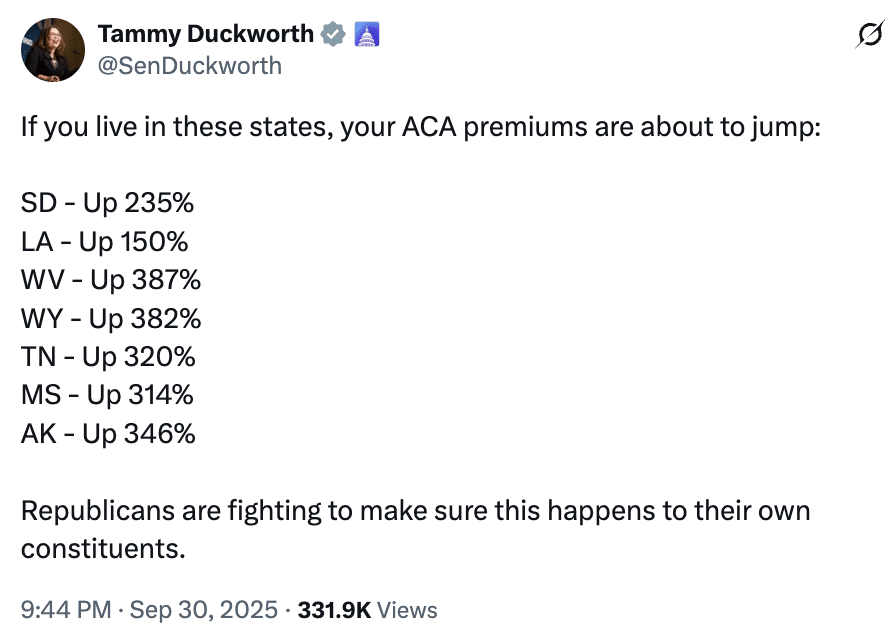
It makes it easy for people to call up John Thune and Mike Rounds, or Bill Cassidy and John Kennedy, or Shelly Moore Capito and Jim Justice, Lummis, or John Barrasso and Cynthia Lummis, or Marsha Blackburn and Bill Hagerty, or Roger Wicker and Cindy Hyde-Smith, or Lisa Murkowski (who voted with Democrats for the first cloture vote on the GOP continuing resolution) and Dan Sullivan and complain about how much they’re fucking them over.
And people in rural states or congressional districts can point to this table and asked their elected representatives why they’re fucking over farmers and ranchers.
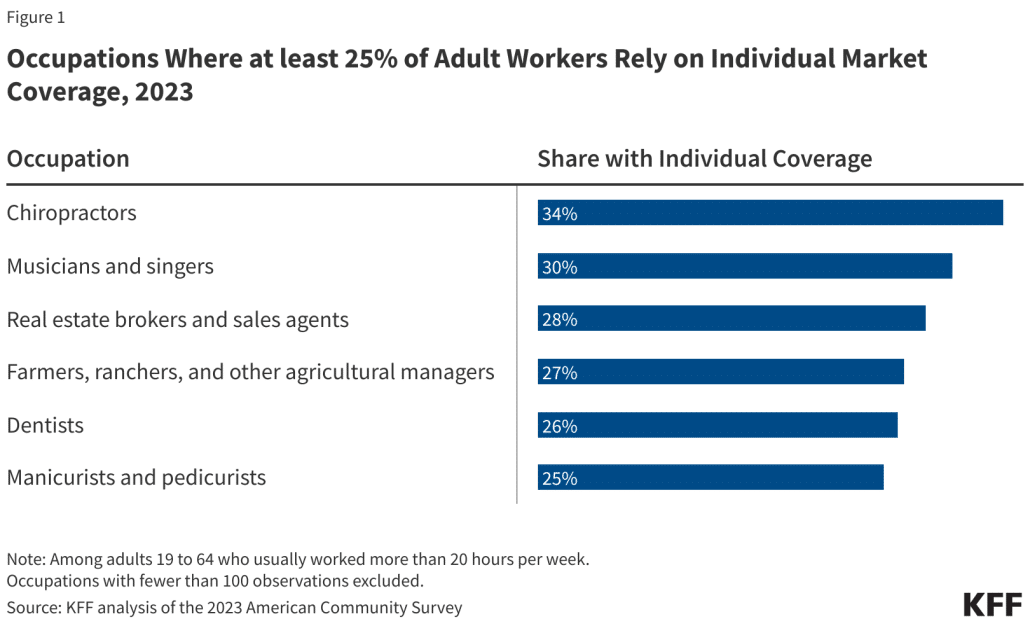
It is slightly harder — but totally doable! — to turn right wing messaging back on them.
 .
.
Every single Republican, starting from Trump’s Wormtongue, is claiming that the Americans who rely on ACA are “illegal.” It’s an atrocious claim, and those who do rely on ACA should easily be able to demonstrate how grotesque this is.
If you have a Republican member of Congress, either House or Senate, please take time to — as visibly as possible, whether on Xitter, a poster by their office, over a beer with your MAGAt brother, or at least in a call to their office — to push back on one of these claims. If you rely on ACA, post a picture of yourself with your military medals or your “I voted” sticker. You won’t convince them. You’ll raise the political price of this cynical bullshit.
Finally, if by some miracle Democrats do get enough leverage to force Republicans to negotiate , it could rupture the lockstep unity that Republicans have achieved this year, because right wingers don’t want healthcare subsidies in any case.
The year-end expiration of health insurance subsidies first created under the Affordable Care Act is already splitting the GOP, seeming to vindicate Democrats’ decision to predicate their shutdown messaging on extending the tax credits.
Republican leaders have been trying to punt the issue as they work to force Democratic senators to swallow a seven-week stopgap measure ahead of the midnight deadline, insisting they will not broach the subject while agencies are closed.
But top Democrats said they heard a different message Monday in their Oval Office meeting with President Donald Trump, leaving the sitdown convinced he’s willing to negotiate on the expiring tax credits in the weeks ahead.
That is already raising alarms among conservative Republicans, who despise the 2010 Democratic health care law known as Obamacare and who would be more than happy to see a 2021 enhancement of the premium tax credits sunset cold turkey on Dec. 31.
“The right proposal is to let them expire,” Sen. Rick Scott (R-Fla.) said Tuesday. “It’s been a complete fraud. People don’t even know they have these policies. So the right thing is to let them expire.”
Rep. Chip Roy (R-Texas), a leader of the hard-right House GOP faction, urged party leaders not to cut an “11th hour” deal on “Covid-era inflationary subsidies” in an X post Sunday.
“We’ve never voted for them. We shouldn’t now,” he said. “Do. Not. Blink.”
But Trump — who has veered the GOP away from anti-entitlement rhetoric on programs like Social Security and Medicaid — has not publicly ruled out an extension of the expanded tax credits, which benefit about 20 million Americans. Instead, in recent days, he has kept his public comments focused on purported Democratic efforts to benefit undocumented immigrants, who are already barred from receiving the subsidies.
We’re all stuck with healthcare being the focus of this shutdown. And, like it or not, it provides a number of points of leverage, both for members of Congress but — just as importantly — for citizens to pressure their own members of Congress.
Building malaise
And all this happens on top of building malaise that has — finally!! — led some MAGAts to start souring on Donald Trump. WaPo unpacked some of the reasons why in this profile of two MAGA voters that explores why 25% of Trump voters are angry about his economy. Much of it stems from the way tariffs are making it impossible for these two to run their small businesses, a florist and a funeral parlor.
A quarter of conservative voters disapprove of Trump’s handling of the economy, polling shows, as tariffs upend business and lower-income Americans cut back their spending. And a recent outcry from MAGA voters and influencers over the Epstein files demonstrates the pressure Trump is under to deliver for his base — which the GOP needs to energize and turn out in the 2026 midterms and beyond.
Jessie said she planned to oppose her local congressman in next year’s GOP primary, upset by his stance on the Epstein files, and she wasn’t sure she could trust Trump’s vice president, JD Vance, who many believe will run to succeed Trump.
Carter, 37, who runs the local funeral home, also voted for Trump last year, believing he would be good for the economy. Now tariffs are pushing up prices for one of his suppliers, and Carter isn’t sure how long he can hold off raising his own rates. The tariffs, he said, “seemed unplanned and childish.”
“I’m not an economist,” he added. “Probably going to hurt before it gets better.”
“But we also really don’t have a suggestion on how to fix that,” Jessie interjected. “We don’t understand enough about it.”
But Epstein and Trump’s dangerous foreign policy is another.
But Carter felt sometimes that Trump was too focused on immigration. Jessie listened to influencers such as Joe Rogan, Theo Von and Tucker Carlson, who often aligned with Trump but sometimes voiced concerns: Was it really “America First” for Trump to bomb Iran? Why hadn’t the Trump administration released the full Epstein files? (Officials released some files this year, but critics called them underwhelming.)
Jessie and Carter were sitting in the living room one day in July when Jessie saw a reference on Facebook to Trump’s latest Truth Social post. Republicans and Democrats alike were pressing for more information on Epstein, and Trump was furious.
“Their new SCAM is what we will forever call the Jeffrey Epstein Hoax, and my PAST supporters have bought into this ‘bullshit,’ hook, line, and sinker,” Trump wrote.
“Let these weaklings continue forward and do the Democrats work, don’t even think about talking of our incredible and unprecedented success,” the presidentcontinued, “because I don’t want their support anymore!”
Jessie turned to her husband.
“It’s gotta be fake,” she said.
For as long as the shutdown lasts, Democrats will be able to point to Mike Johnson’s efforts to delay the swearing in of Adelita Grijalva, who would have been the final signature on the discharge petition to force the government to release their files, as part of his effort to cover up for a sex trafficker.
And during the shutdown, there will continue to be disclosures, such as the recent news that Elon Musk, Peter Thiel, and Steve Bannon are all in the Epstein files. Todd Blanche asked Ghislaine Maxwell about Musk (who in any case denies he traveled to Epstein’s island), but did not ask about Thiel and Bannon, suggesting that Thiel’s funding of the sex trafficker may be among the things the Trump Administration is trying to hide. And Tara Palmeri just revealed that the deciding vote in the Senate against releasing the files, Lisa Murkowski, may implicate ties Murkowski has to Ghislaine’s spouse. Just today, WSJ described how many more banks were happy to do business with a convicted sex trafficker after Epstein was convicted.
Then there’s the Argentine bailout. While Treasury has not yet released guidelines on the bailout (it has, however, posted Scott Bessent’s positively craven speech to explain why Javier Milei warranted an Atlantic Council global citizenship award), when Bessent announced the bailout on Xitter, he described that Argentina was “a systemically important U.S. ally,” the kind of language that suggests he can orchestrate this bailout (ahead of an election in 25 days) even in spite of the shutdown.
This is the kind of story that can fester.
As Politico described, Republicans are already outraged that Trump is bailing out Argentina even as Argentina poaches America’s soybean markets (which I emphasized here).
[P]owerful agriculture groups and their Republican allies in Congress are also sounding alarms about the deal.
“Why would USA help bail out Argentina while they take American soybean producers’ biggest market??? We shld use leverage at every turn to help hurting farm economy Family farmers shld be top of mind in negotiations by representatives of USA,” Sen. Chuck Grassley (R-Iowa) said on X Thursday.
Grassley said farmers were “very upset” about Argentina “selling soybeans to China right after USA bail out.”
The American Soybean Association said Argentina, a major agricultural producer, sold 20 shiploads of soybeans to China around the same time Bessent announced the U.S. was exploring a financial package. The transaction was eased by Buenos Aires waiving taxes on its soybean exports. China has turned to other major soybean exporters, such as Argentina and Brazil amid a trade war with the U.S.
The White House directed POLITICO to Trump’s comments in the Oval Office on Thursday, where he said he’d use some of the windfall from tariffs to support U.S. farmers. The White House added that the administration believes an Argentine economic collapse would hurt U.S. farmers more by lowering the price of Argentine agricultural commodities. Treasury did not comment.
A person familiar with the discussions within the Trump administration about Argentina, indicated Milei’s star has dimmed in some corners in the administration. The person, who was granted anonymity to speak freely about the administration’s evolving approach to Argentina, said this policy is being mainly pursued by Treasury and expressed concerns about Milei’s ability to actually lift his country out of its economic doldrums.
“Milei is done politically, his sister is corrupt, his finance minister is an insider trader, and they have pissed away $15 billion in IMF money and $15 billion in central bank reserves propping up a crap currency, and now Treasury wants American taxpayers to double down on stupid,” the person said. The person added that Milei “was a fraud. Came in, betrayed all the conservatives and libertarians that supported him … it’s all a wash.”
Democrats are not letting this one slide. Not only did Elizabeth Warren (predictably) start the pushback on it, but fourteen Democrats, including Schumer, wrote a letter to Bessent making a stink about about it.
American farmers are confronting unprecedented challenges under your sweeping and uncertain trade policies. Across-the-board tariffs are increasing the cost of critical inputs farmers need to produce a crop, like fertilizer and equipment, at the same time retaliatory tariffs are making U.S. agricultural products less competitive and putting key export markets at risk. Nearly 20 percent of U.S. farm production is typically sold to customers abroad. With those markets in jeopardy, farmers and businesses across the agricultural supply chain are now facing falling commodity prices and shrinking profit margins, while farm debt, bankruptcy rates, and distressed operations are rising across the country. Soybean producers have been particularly affected, as China – historically our largest agricultural export market – has purchased no U.S. soybeans since May and bought 51 percent less through July compared to the same period last year.
Despite the crisis facing our farmers, your attention appears to be elsewhere: last Monday, September 22, your Administration announced it “stands ready to do what is needed” to bail out Argentina amidst the country’s economic turmoil. Argentina’s President, Javier Milei, is notably one of your close personal friends and ideological allies and faces a crucial midterm election on October 26.
Immediately following your Administration’s announcement regarding potential U.S. financial support for Argentina, Argentina suspended export taxes on soybeans, corn, wheat, and other agricultural commodities. Argentina’s policy change had immediate consequences for American farmers. Argentine agricultural products are now significantly more competitive on global markets, and Chinese buyers have reportedly purchased up to 40 cargoes of soybeans from Argentina in just one week. Now, even after Argentina suspended its export duties, your Administration is moving full steam ahead with its plans to offer financial assistance to the tune of $20 billion – rewarding a country that has implemented policies that directly disadvantage American farmers in favor of our competitors.
It is unclear why you are choosing to use taxpayer dollars to bolster the reelection campaign of a foreign president while they take steps to undermine U.S. farmers. As the American Soybean Association put it last week: “U.S. soybean prices are falling; harvest is underway; and farmers read headlines not about securing a trade agreement with China, but that the U.S. government is extending $20 billion in economic support to Argentina.”
Rather than reversing course on tariffs or abandoning your plans to bail out Argentina, you are reportedly planning to provide American farmers with an aid package, nominally paid for with tariff revenues. Farmers want fair trade and steady markets, not tariff uncertainty and short-term aid payments. The best way to support American producers would be to end your chaotic tariff policies that are hamstringing farmers in the first place. Meanwhile, your Administration has failed to reach any trade deal with China that would restore market access for U.S. soybean farmers.
Even Ruben Gallego, who didn’t sign the letter, is willing to shittalk about it.
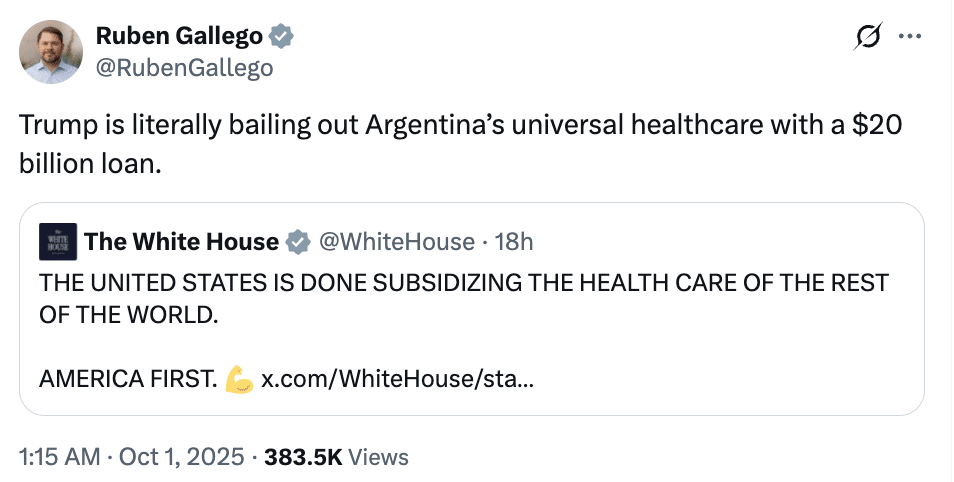
All that’s before anyone looks closely at Bessent’s own personal stake in this bailout, which Judd Legum explained.
Bessent’s announcement had massive economic benefits for one American: billionaire hedge fund manager Rob Citrone, who has placed large bets on the future of the Argentine economy. Citrone, the co-founder of Discovery Capital Management, is also a friend and former colleague of Bessent—a fact that has not been previously reported in American media outlets. Citrone, by his own account, helped make Bessent very wealthy.
Since Javier Milei, a right-wing populist, became president of Argentina in December 2023, Citrone has invested heavily in Argentina. Citrone has bought Argentine debt and purchased equity in numerous Argentine companies that are closely tied to the performance of the overall economy. Due to Argentina’s massive debt load and chaotic economic history — in 2023, Argentina’s inflation rate was over 200% — Citrone purchased Argentine bonds with an interest rate of nearly 20%. (Citrone has declined to detail exactly “how much of the $2.8 billion he manages is invested“ in Argentina.)
Citrone, who is also a minority owner of the Pittsburgh Steelers, is effectively betting on Milei’s right-wing economic program, which emphasizes deregulation and sharply reduced government spending. Citrone viewed “the probability of default as minuscule,” even though Argentina has defaulted on its debts many times in the past.
In the short term, this appeared to be a savvy investment. After taking office, Milei fired tens of thousands of government workers, cut spending on welfare and research, and achieved fiscal balance. Inflation was reduced to around 40%, which spurred economic growth and foreign investment. Argentina’s economic rebound contributed to Discovery Capital’s 52% return in 2024.
Then it all came crashing down.
[snip]
In early September, days before Bessent’s announcement, Citrone purchased more Argentine bonds.
Bessent’s personal and professional relationship with Citrone has spanned decades. In a May 14 appearance on the “Goldman Sachs Exchanges” podcast, Citrone revealed how he delivered a financial windfall for Bessent. They were both working for investor George Soros in 2013 when Citrone convinced Bessent and Soros to bet on the U.S. dollar against the Japanese yen.
[snip]
When Argentina’s economy began to falter in April, it was Citrone who “intervened before Scott Bessent…to advocate for an IMF agreement with Argentina,” CE Noticias Financieras reported. Bessent subsequently played a key role in convincing the IMF to extend a separate $20 billion currency stabilization package. (That package ultimately proved insufficient to stabilize the Argentine peso.)
As Legum describes, there’s also a tie with the much more visible CPAC.
As Gallego made clear: Donald Trump is paying for Argentines to have better healthcare than Americans even while Americans start to go without basic food support. It’s the kind of sell-out that will infuriate Trump’s base.
Finally, consider how a longer shutdown will work.
ICE is funded. Not only would Trump declare ICE essential in any case, many of their operations were funded by the very same Big Ugly bill that cut healthcare.
And so ICE goons will still be wandering the streets, kidnapping people’s grannies, hospitalizing journalists, with their butt cracks and beer bellies creating a spectacle that sours people on ICE. And that will be happening even as people start losing essential benefits.
Nothing will demonstrate more starkly Trump’s — Stephen Miller’s, really — promise of government. Miller wants government to do nothing but kidnap brown people, even as working white people lose their safety net and pay higher prices.
No one knows how this shutdown will go. It truly is unlike any shutdown that has gone before.
But it will serve to make the reality of Trump’s abuse of power visible in a way that has not fully happened yet.
Update: Corrected description of Palmeri’s find about Murkowski. 2nd Update: An now fixed the spelling of her last name.



